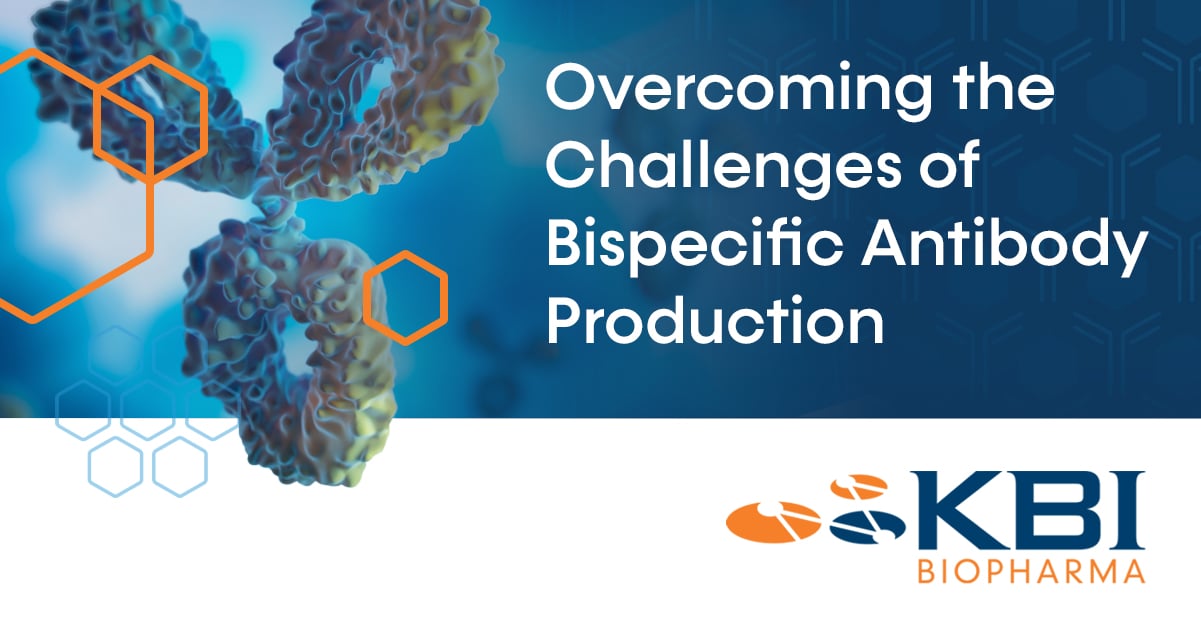1 min read
Publication | LC-MS characterization & purity assessment of a prototype bispecific antibody
Woods, R., Xie, H., Von Woods, R., Xie, H., Von Kreuenstein, T., Ng, G., Dixit, S. LC-MS characterization and purity assessment of a prototype...
2 min read
 KBI Biopharma
Jan 10, 2023 9:45:34 AM
KBI Biopharma
Jan 10, 2023 9:45:34 AM
Antibody-based therapeutics, which are comprised of antibodies that target and attack specific antigens, have dramatically risen in popularity. Antibody-based oncology therapies and COVID-19 treatments are in particularly high demand.
This leaves suppliers with the challenging task of quickly developing and manufacturing antibody therapies at scale. In this article, we break down the hurdles of antibody development and manufacturing and discuss exciting antibody developments in the near future.
Before you can begin commercial manufacturing of antibody-based therapies, researchers first have to develop them. The process consists of generating antibody-producing cell lines, expanding them, providing cells with nutrients to produce the target, and purifying the antibodies for therapeutic application.
Traditional monoclonal antibody (mAb) development involves isolating naturally occurring mAbs that target a single epitope. However, antibody-based therapies have become far more complex with the introduction of bi-specific and multi-specific antibodies. These therapies are synthetically engineered antibodies that can target multiple epitopes. This dramatically expands the therapeutic potential of antibody-based therapies. However, these unique therapies are more complex and difficult to develop.
There are many challenges in developing complex antibody-based therapies. Effect of cell lines that produce the multi-specific target, high titers out of upstream, analytical panel expansion, and the complexity of incorporating product-related impurity removal steps within a downstream process have added complexity to Fc-containing biologics development. Additionally, multi-specifics may have reduced solubility or stability depending on construct design, which can pose additional process definition and formulation challenges. Once the process is defined, manufacturing often follows a similar pathway to traditional mAbs.
Many issues associated with traditional mAb manufacturing have been resolved with improvements in mAb structure stability, creating highly productive and stable cell lines. Existing bottlenecks are primarily operational challenges rather than fundamental technology limitations.
A significant operational challenge to manufacturing is the intensified cell culture processes, which can have up to ten times the cell density of standard processes and can require customized media/feed and a robust harvest solution. As cell culture titers continue to increase across the industry, the ability of the downstream process to handle the quantity of product produced continues to pose challenges. Resins with higher binding capacities and adopting continuous capture and volume control strategies (i.e., SPTFF) have helped curtail some of these challenges. Still, as titers continue to increase, new solutions may need to be employed.
While bi-specific, multi-specific, and Fc-fusion proteins are becoming a more significant portion of the portfolio for most biotech companies, standard mAbs are still a dominant force due to their efficacy and scalability. The industry will continue to see an influx of mAbs into the market for the foreseeable future, especially given the therapeutic applications for infectious disease and targeted oncology treatments.
Despite the difficulty suppliers face in development and manufacturing, continued investment in complex therapies is necessary for the future of human health. Antibody therapies with the ability to target multiple antigens have demonstrated promising potential for immuno-oncology treatments, with more developments in the future as many enter early stages of clinical trials.
At KBI, our portfolio contains an even split between mAbs and more complex molecules. Developing treatments for the present while planning for future innovation is core to our mission of providing patients with the solutions they need most. As antibody therapies flourish, whether traditional or synthetically engineered, their impact on multiple disease indications will only continue to grow.
If you are interested in learning more about KBI’s work, please reach out to our team. We'd love to hear from you!
1 min read
Woods, R., Xie, H., Von Woods, R., Xie, H., Von Kreuenstein, T., Ng, G., Dixit, S. LC-MS characterization and purity assessment of a prototype...

2 min read
Bispecific antibodies (bsAbs) are rapidly emerging as a significant class of biotherapeutics. Unlike monoclonal antibodies (mAbs), which have a...
1 min read
Liu, Z., Mostafa, S., Shukla, A. A comparison of Protein A chromatographic stationary phases: performance characteristics for monoclonal antibody...